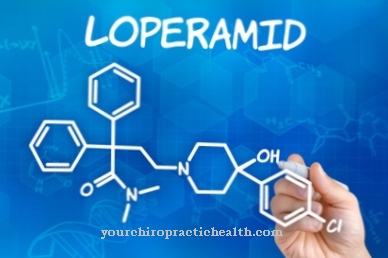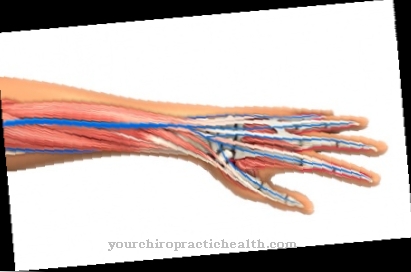Numerous jokes and the unfortunately often imitated symptoms of stuttering show again and again that many people consider this ailment to be a funny matter. Others believe that admonitions, teachings, self-control, and determination can remedy the language disorders. However, both opinions testify to ignorance that stuttering is a disease - a language sickness.
Symptoms & causes of stuttering

During normal speech, breathing, larynx function and articulation movements, for example of the lips and tongue, must be coordinated. This happens unconsciously and is therefore not rated as a special achievement. If this coordination is disturbed, a noticeable, characteristic language disorder, the stuttering, develops. Since it is a fairly common condition - it affects around one percent of the general population - the symptoms are familiar to everyone.
The fluent language is interrupted by cramp-like movements of the breathing, larynx and speech muscles. We differentiate between two types of convulsions. The clonic convulsions lead to rapid repetitions of some sounds, especially the explosive sounds (k, p and t). In the case of tonic cramps, the sounds can only be pronounced after prolonged pressing. Consonants are more difficult than vowels. Stuttering occurs mainly in free speech, in answering and in difficult situations, less in repeating and taking part, counting, whispering and singing.
Some people only stutter when dealing with a certain group of people, for example with superiors or strangers, while they can talk freely at home or with friends. Uncertainty and inhibitions thus hinder the stutterer in dealing with other people; as a result, he often becomes shy of people, his self-confidence disappears, so that he can finally lose his mental balance completely.
Inferiority complexes and even suicidal thoughts arise. The result is an extremely excruciating condition, a functional disorder known as neurosis as a result of the abnormal reaction of the nervous system to the environment, a real, highly stressful disease that requires understanding and helpfulness from the environment.
Stuttering is often seen in children where similar cases have already occurred in families. That is not to say that stuttering is hereditary. Damage that the child experiences during, before and shortly after birth, nutritional disorders, infectious diseases that cause a general reduction in physical and mental resistance, experiences of horror, accidents, upbringing errors, conflicts in the parental home, imitation and more can then trigger stuttering.
In some phases of life there is particular danger. Children between the ages of three and four usually want to speak more than they can.However, their vocabulary is not yet able to cope with the increased demands, and their speaking tools are not yet trained to speak quickly. This can lead to "getting stuck" and "rolling over".
This repetition of syllables does not occur infrequently in a certain linguistic development stage and is not yet to be regarded as pathological. It is a pathologically conditioned reflex that can be overcome. The child must not become conscious of this so-called developmental stuttering. This stuttering should be ignored by the educators as far as possible.
Under no circumstances should a child be encouraged to repeat what is wrongly pronounced correctly. The symptoms then usually go away on their own after a short time. The next cliff is the start of school. Changes in the milieu and new tasks can trigger the language disorder again. The last crisis is the time of puberty with its physical and mental changes. So stuttering usually begins in childhood and adolescence.
You can find your medication here
➔ Medicines to improve concentration and language skillsTreatment & Therapy
There have been and still are numerous errors in the treatment of stuttering. In 1841, cutting out a wedge-shaped piece from the back of the tongue was recommended. This procedure was very painful as the anesthesia was not yet known. In some cases it was even fatal. Today it is difficult for us to imagine success because of this, because stuttering is not an organic disease caused by an abnormal tongue, for example.
Nevertheless, parents keep coming to the consultation with the erroneous view that cutting the frenulum of the tongue can help. Hypnosis and electrotherapy do not help against stuttering either. For treatment, it is advisable to introduce the child to a speech, neurologist or pediatrician or to a speech therapist. One is always amazed to see adult stutterers in consultation hours who have been struggling with the disease since childhood without ever having sought medical help. During treatment, it is important to recognize and take into account the roots of the suffering, which lie in the sphere of experience. In older patients, relaxation is sought through speech exercises and a new type of speaking is established, an often lengthy and unfortunately not always successful measure.
Soothing medication has a supportive effect. Children must have adequate sleep, easily digestible food rich in vitamins, a calm home atmosphere, consistent, but not strict, upbringing and a regular daily routine. Sports with a rhythmic course, such as jogging and slow swimming, have a beneficial effect. It is also extremely harmful to criticize or even punish children for their speech defects. Dealing with them requires calm and patience on the part of family members and educators. Special consideration must be given in school, mainly during oral exams, which in some cases should be avoided altogether.
For severely stuttering and unsuccessfully treated children, speech healing schools, some with boarding schools, have been set up in almost all federal states, in which, according to the normal school curriculum, lessons are carried out by speech therapists and the therapy is incorporated into the entire daily routine in this way. So there are plenty of ways to help stuttering people. It is important that they are recognized and exploited, that the patients do not give up, but are enabled through understanding and support of their fellow human beings to correctly assess and overcome their suffering.













.jpg)











